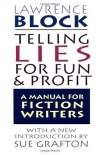Manual For Fiction Writers by Block, Lawrence (classic books to read .TXT) 📗

Book online «Manual For Fiction Writers by Block, Lawrence (classic books to read .TXT) 📗». Author Block, Lawrence
In the old days, I'd have gone directly to my typewriter. And, most likely, I'd have gotten nowhere with the story, because this particular idea was not an easy one to turn into a piece of short fiction. Furthermore I had no plot, no theme, no characters, no conflict?nothing but the bare idea as I've described it to you. I could have tried contriving these other elements at the typewriter, but instead I procrastinated.
I made a note to myself on the little memo pad I carry around. Man solves own murder, I scribbled, right between Pick up laundry and Water philodendron. Every now and then my eyes would hit those words and I'd tell myself I'd have to get around to doing the story one of these days.
Each time this happened, my subconscious got a little nudge. Gradually, these little nudges made a collective impression.
My original concept of the story, never fully formed and never committed to paper, called for the lead character to operate on some sort of spectral plane, perhaps spooking the killer into a confession, something eerie like that. After a spell of creative procrastination, I changed this. I decided the lead would die clinically in the operating room while they were removing the bullet or some such, would then have an after-death experience of the sort Moody described, in the course of which he'd be given to understand that he could not be permitted to die until he'd carried out the mission of finding out who had killed him. Whereupon he'd return to life and set about investigating the circumstances of his murder.
Much better, I decided. The story was starting to have a shape to it. But I still didn't feel ready to write it, so I put it back in a warming oven and left it alone.
A while later, I was reading poetry. I wasn't reading Robert Frost, but something reminded me of Frost, and I realized the title I wanted for my story was And Miles to Go Before I Sleep. I wrote that on my memo pad and crossed out Man solves own murder. (I'd already picked up the laundry by that point.)
I like having a title before I write a story. I certainly don't insist on it but it helps. So I had the title now, and it was a good one, but I still didn't have the story.
So I put it off again.
A week or a month later, I started thinking about the lead, trying to figure out who he was. And who had killed him? And why? I wasn't sure, but I decided maybe he was a middle-aged businessman. I provided him with a wife and a business partner and a mistress and a son and a daughter, and I gave all five of them motives so they could be suspects. Vague motives, because they were still vague people, and because I had no idea which of them was the killer.
Time for more procrastination.
One day, you'll be pleased to hear, I decided I was ready to write the story. I don't know what told me this; most likely I was avoiding work on something else. At any rate, I sat down at the typewriter and got to work.
Somewhere along the way I had decided to write the story in the first person. It was trickier to do it this way, describing those after-death experiences in the lead's voice, but all that time spent living with the story convinced me it was the way I wanted to do it. And it turned out to be easier than I'd thought, because the mood and tone came rather easily to me by now.
Another interesting thing that happened is that the lead turned out to have more of a purpose than simply bringing his killer to justice. As he investigated each suspect, he found himself resolving his unfinished business with each in turn, putting his emotional affairs in order before dying for a second and final time. This change turned a simple gimmick story into something with substance.
I was pleased with the way the story turned out. It didn't seem to need substantial rewriting, perhaps because it had received so much unconscious modification and restructuring before I sat down to write it. Eleanor Sullivan liked the story and bought it for Alfred Hitchcock's Mystery Magazine, where it appeared as Life After Life in the October '78 issue, should you care to see for yourself how it ends.
My point, though, isn't that I produced a brilliant piece of work or won fame and fortune with it. It's not and I didn't, but it would surely never have reached its present form if I hadn't repeatedly put off until tomorrow work I was insufficiently prepared to do that day.
Code of Arms is another example of creative procrastination in action?or inaction, come to think of it. I first got the germ of the book a full four years ago. I was reading something about World War II and wondering, not for the first time, why on earth Hitler had halted the German armor outside of Dunkirk. That two-day respite permitted Britain to withdraw a quarter of a million troops; otherwise she might have been unable to continue the war.
Suppose some Englishman had penetrated the Wehrmacht High Command? Suppose that was the cause of the stop order?
I decided that would make the premise of a hell of





Comments (0)